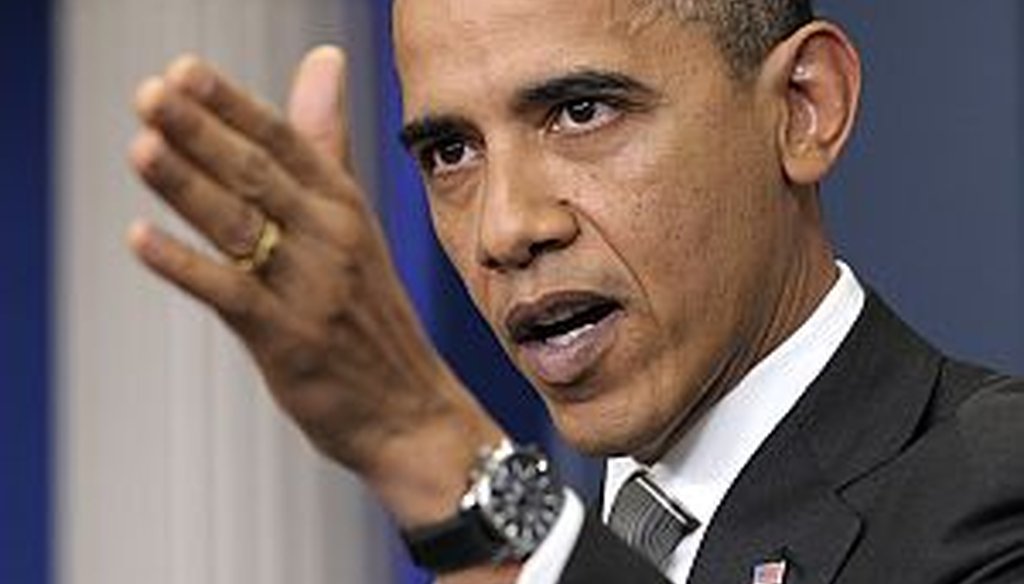Get PolitiFact in your inbox.

President Obama defends a tax compromise at a press conference on Tuesday.
President Barack Obama has sacrificed one of his top campaign promises -- raising taxes on high earners -- in a compromise with Republicans to extend current tax rates for everyone for another two years.
Though Obama reversed his position on one of his signature campaign pledges and has come under fire from many in his party, he also got Republican support for some of his other initiatives.
As part of the deal, Obama got a major extension of unemployment insurance, a two-year continuation of college tax credits and other credits in the 2009 stimulus, a measure to allow businesses to expense all of their investments in 2011 and a payroll tax reduction in 2011 that will increase take-home pay for workers.
Some of those measures were part of Obama's campaign promises to improve the economic standing of the middle-class. PolitiFact has been tracking more than 500 Obama's campaign promises since the 2008 election. As the deal moves forward, we'll be changing ratings to Obama's promises to raise taxes on the wealthy as well as on his promises about tax cuts for workers.
One important point about Obama's tax compromise is that it was made in a world different from the one anticipated when he was making promises during the campaign. Obama's economic promises anticipated a mild downturn, not a major economic crisis. But this week's compromise was crafted after unemployment numbers edged up to an unexpected 9.8 percent.
Obama defended the compromise Tuesday as a way of keeping his promises to improve the standing of middle-class Americans. "A long political fight that carried over into next year might have been good politics, but it would be a bad deal for the economy and it would be a bad deal for the American people," Obama said during a press conference.
Whether the deal makes it through Congress remains to be seen, and staff members are still working out details of the legislation. Here's how the deal stacks up against some Obama's major campaign promises.
Tax breaks continue for higher incomes
Obama said he still opposes continuing the current tax rates for higher earners but that has been unable to persuade a majority of the Senate to go along with his position. He said he will continue to argue against making the tax rates permanent. Besides income taxes, the deal also includes leaving capital gains taxes at their current rates and setting inheritance taxes at levels below what Obama has previously proposed but reinstating them after a year in which they had lapsed.
The deal continues for two years the current tax rates for individuals who make less than $200,000 or couples who make less than $250,000, the benchmarks for income Obama set during the campaign.
The announcement of a framework indicates clearly that Obama is willing to compromise on his promise. For now, we're moving this promise to Stalled, and watching to see if the legislation passes.
Tax credits for workers
The compromise with Republicans would continue several tax credits that were part of the 2009 stimulus, including a child tax credit, an expanded earned income tax credit and a college tuition credit.
The stimulus also included small decreases in payroll taxes. The compromise deal includes a much bigger and unexpected reduction for 2011, knocking back payroll taxes by a full 2 percent. For now, we're changing the ruling on this promise from Compromise and moving it back to In the Works.
The payroll tax holiday would mean $400 for the year for workers who make $20,000; $800 for workers who make $40,000; and $2,000 for workers who make $100,000. Social Security taxes only apply to incomes below $106,800, so the measure particularly benefits workers below that threshold. That's significantly more than the $500 maximum tax credit that was part of Obama's campaign promises.
The payroll tax holiday could inject $120 billion into the economy, said Gus Faucher, director of macroeconomics at Moody's Economy.com.
"We think it is going to make a substantial difference for job growth compared to what we were expecting just last week," Faucher said. The forecasting group increased its estimates for job growth in 2011 from 1.3 million new jobs to 2.8 million new jobs, based on the payroll holiday and a few other smaller measures included in the framework.
Extending unemployment insurance
Back in 2008, Obama promised to extend unemployment benefits a mere 13 weeks, a measure included in the economic stimulus passed in early 2009. At the time, we rated the promise Promise Kept.
But unemployment has been so high for so long that many economists say the further extension supported by Obama is necessary. A telling statistics is that 42 percent of the unemployed have been without a job for 27 weeks or longer, said Daniel Hamermesh, an economist at the University of Texas at Austin.
"That is a much higher percentage than in any previous recession, suggesting that a large number of households have been without at least one income for many, many weeks. So supporting their income for another year makes sense," Hamermesh said.
The deal extends unemployment for over a year -- 13 months -- and it would go to workers who have exhausted the normal benefits of 26 weeks, but haven't yet hit the legal maximum of 99 weeks. The rating stays at Promise Kept.
Our Sources
The White House, Statement by the President on Tax Cuts and Unemployment Benefits, Dec. 6, 2010
The White House, Fact Sheet on the Framework Agreement on Middle Class Tax Cuts and Unemployment Insurance, Dec. 7, 2010
The White House, Press Conference by the President, Dec. 7, 2010
Interview with Daniel Hamermesh of the University of Texas at Austin
Interview with Gus Faucher, director of macroeconomics at Moody's Economy.com















































